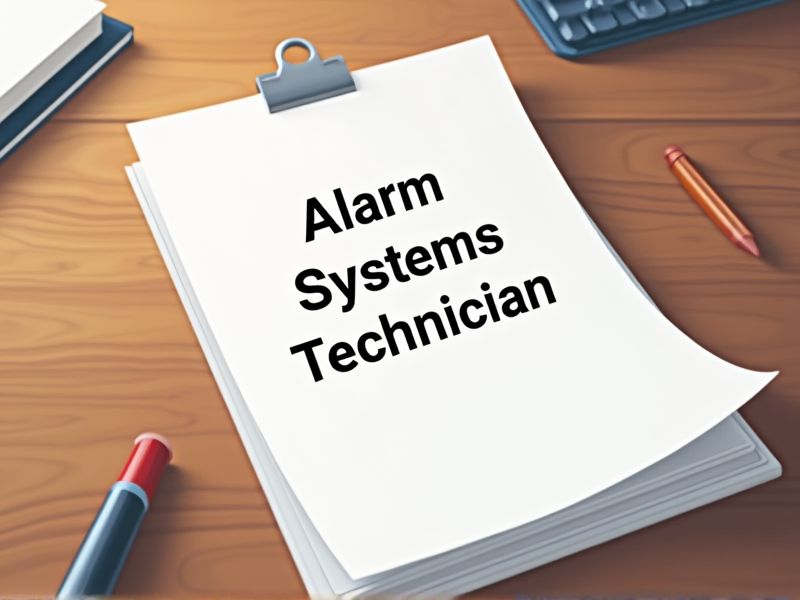
Alarm Systems Technicians play a critical role in ensuring the safety and security of buildings and assets, requiring a robust understanding of both technical and regulatory standards. Obtaining certain certifications equips them with specialized knowledge of alarm technology, wiring systems, and industry protocols, reducing the risk of system failures and enhancing response efficiency. As technology evolves, continuous education and certification ensure that technicians remain current with the latest advancements and compliance requirements. Here are some certifications that are crucial for an Alarm Systems Technician.
NICET Level I Certification for Intrusion/Fire Alarm Systems
Obtaining NICET Level I Certification for Intrusion/Fire Alarm Systems ensures that an Alarm Systems Technician possesses foundational knowledge relevant to the industry. This certification provides a structured understanding of design, installation, and maintenance practices, promoting safety and compliance with industry standards. Employers often require this certification to verify a technician's commitment to professional development and capability in handling fire alarm systems. Holding the certification can enhance job prospects and career growth by demonstrating technical competencies and a dedication to quality workmanship.
NICET Level II Certification for Intrusion/Fire Alarm Systems
Earning the NICET Level II Certification in Intrusion/Fire Alarm Systems ensures a technician possesses an advanced understanding of complex fire alarm and security systems. With the growing emphasis on safety standards, certified technicians are more likely to meet the requirements set by employers and regulatory bodies. The certification demonstrates an individual's capability to handle more sophisticated tasks, such as system design and troubleshooting. As demand for skilled technicians rises, having this certification often results in better job prospects and potential salary increases.
State Alarm Systems Technician License
The State Alarm Systems Technician License ensures that technicians meet specific qualifications and training requirements, which promotes a standard of safety and reliability. Licensing helps protect consumers by certifying that technicians possess the necessary skills to install and maintain security systems properly. Regulatory oversight becomes possible with licensing, reducing the likelihood of security breaches or system failures due to untrained individuals. When licensed, technicians can legally perform their tasks, avoiding potential legal or financial penalties for unauthorized work.
Underwriters Laboratories (UL) Certification for Alarm Installations
Underwriters Laboratories (UL) Certification ensures alarm systems meet stringent safety and performance standards, resulting in reliable operation. This certification builds trust among clients and insurers, often mandating UL-certified systems for property protection policies. Technicians with UL knowledge can effectively install and troubleshoot systems, minimizing failures and liabilities. Requiring UL Certification promotes industry competence, reducing risks associated with poorly installed or non-compliant alarm systems.
NFPA 72 Code Compliance Certification
Compliance with NFPA 72 Code Certification ensures that alarm systems technicians adhere to standardized practices for fire alarm installation and maintenance, reducing the risk of system failures. It grants technicians the credibility needed to work in environments where fire safety is paramount, instilling confidence in clients and employers. Non-compliance may result in legal consequences and potential fines, as local authorities often mandate adherence to these standards. Certification facilitates continued education and mastery of the latest technological advancements in alarm systems, aligning technician skills with industry developments.
OSHA 10-Hour Construction Safety Certification
The OSHA 10-Hour Construction Safety Certification provides alarm systems technicians with critical knowledge on workplace hazards, which reduces the risk of injury. Understanding OSHA guidelines ensures technicians are aware of and adhere to safety regulations, promoting a safer work environment. Employers often require this certification to maintain compliance with federal safety standards, which can prevent costly fines and legal issues. Enhanced safety skills contribute to a reduction in accidents, leading to increased productivity and employee satisfaction.
OSHA 30-Hour Construction Safety Certification
OSHA 30-Hour Construction Safety Certification is necessary for an Alarm Systems Technician as it equips them with extensive safety knowledge specific to construction environments. This certification significantly reduces workplace injuries and accidents, ensuring technicians can operate within compliance standards. Knowledge from the OSHA course empowers technicians to identify potential hazards and implement effective risk management strategies. Companies employing certified technicians often see enhanced productivity and reduced insurance costs due to improved safety practices.
Electrical Wiring and Circuitry Certification
Having Electrical Wiring and Circuitry Certification ensures proper installation, reducing the risk of safety hazards and system failures. Certified technicians are often seen as more reliable by employers and clients, leading to increased job opportunities and trust. Certification reflects an understanding of local codes and regulations, ensuring installations are compliant and minimizing legal risks. Properly certified technicians bring higher efficiency in troubleshooting, which can decrease maintenance costs and system downtime.
Security Industry Association (SIA) Alarm Systems Certification
The SIA Alarm Systems Certification ensures alarm systems technicians possess the necessary skills and knowledge to install and maintain security systems effectively. Training in industry standards reduces the risk of installation errors, which can lead to system failures and security breaches. Certification enhances technicians' credibility, fostering trust with clients and employers. Certified technicians are more likely to stay updated with technological advances and regulatory changes, improving service quality.
First Aid/CPR Certification
An Alarm Systems Technician often encounters emergencies where immediate response is crucial, making First Aid/CPR Certification vital to provide essential care. In high-risk situations with electrical incidents, technicians are more prepared to assist colleagues or clients experiencing distress. Certification enhances workplace safety culture, ensuring compliance with safety regulations and employer requirements. CPR knowledge increases technicians' confidence in handling unforeseen medical emergencies effectively.
Summary
With certifications, you enhance your credibility and gain trust from clients and employers. Certified expertise in alarm systems often leads to increased job opportunities and higher salary potential. You also acquire specialized knowledge, which improves job performance and problem-solving abilities. Employers may prefer certified technicians due to proven skills, enhancing your career prospects.
